As an FYC for all things Mare of Easttown, Eric and Nathaniel got together for a conversation about what a rich viewing experience the HBO miniseries was.
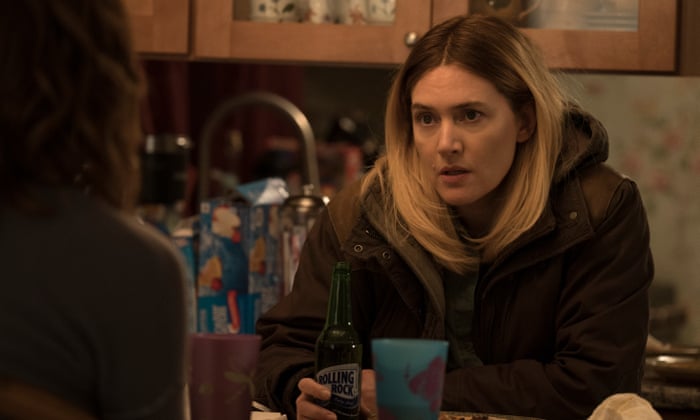
ERIC BLUME: Nathaniel, now that Mare of Easttown has wrapped, I'm sure viewers will want to talk about it, least of all because it features Kate Winslet giving one of the greatest performances of her life. But more on that later. First, let's talk about overall impressions of the show. While it certainly has its flaws, one of the things I loved about it the most was its capture of small details in the lives of the characters and the setting. I spent the first 18 years of my life in Pennsylvania, and the show captures so many of the nuances of PA life. I loved how everyone was a cousin (cousins are a thing in PA); how people just walked into the front door of the homes of their friends; how everyone has a nickname (Lori is mostly called "Lor").
The production design was incredible. Every home, exterior and interior, looks like the house a middle-class Pennsylvania person lives in. Jean Smart's afghan alone should win that team an Emmy...

While the PA accents were a little all over the place (Evan Peters' was the most spot-on), what they capture is this sort of "secret language" that exists in these kind of towns, where everyone says -- and more importantly doesn't say -- the same kind of things. The show really was extraordinary in that way. What was one of the strongest elements of the show in your mind?
NATHANIEL: Thank you for initiating this conversation. As the world fell in love with Mare (and, to a lesser extent Easttown) I was kicking myself that we hadn't covered the show on an episode by episode basis. Which, speaking of, becomes my answer to your question. Mare of Easttown does what all the best examples of television do in that it deepens your understanding of the character, story, and place with each new episode. Which is to say that I wasn't entirely invested in the first hour but was obsessed by the time it finished.
I blame my initial hesistation on adjusting to Kate's accent and sourness (we last saw her in the also depressed Ammonite so I was like "will Kate ever dazzle us by smiling again?" She did that so often and with such radiance in her early enchanting performances. It's hard not to talk about Kate yet but back to the point.
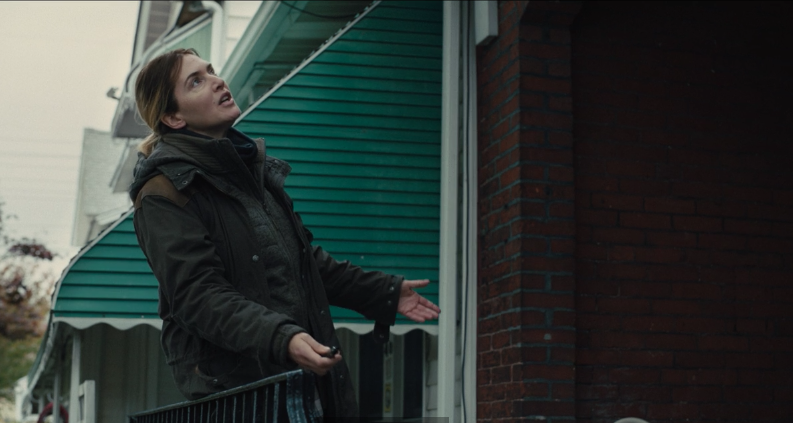
With each new episode and every time there was a new plot wrinkle or tonal shift -- was it episode 3 or 4 where the show was suddenly funny (!?!) -- I was less and less eager for it to end. Here we should note that I am quite impatient with television since so many miniseries would have better pacing if they just admitted they only had enough material to ne a movie. The "whoddunit" nature of the show began to take a backseat for me in kind of the way it does in, say, Gosford Park, where you just become deeply invested in the characters instead. Now the more I look back on it, I realize the nimble sleight of hand the show was doing all along. How do you keep a mystery and a magic trick engaging? With abundance! There were so many fun or peculiar or upsetting characters and relationships to be interested in that even scenes that eventually had big payoffs (like Mare's comical annoyance with that old couple and their security camera) felt like organic world-building rather than clue dropping. Do you know what I mean?
ERIC: I know exactly what you mean. The story details, character relationships, and environment are all so deeply textured...the show gives you both melodramatic jolts and a slow burn, not a combination one sees often. They really capture that sense of dead-endedness that one grows up with in a town like that, not only without judging the characters but instead making you feel for their struggle. The show creators go to great lengths to build the wider community of characters, but imbue them all with grace notes. You can see their humanity. Case in point, when Beth's drug-addicted brother prank-calls and arranges to steal the money from Dawn, where she sees him and he just comes clean to her. You feel his horrible desperation in that moment, and you believe Beth covering up for him. Part of the beauty of the show is the characters recognizing and feeling other peoples' pain. But you mention, the "whodunnit" element of the show, so let's talk about that for a moment...how did you feel it worked from a narrative standpoint? Were you satisfied with the crime element of the show...did you feel the story was well-told and compelling, or was it less successful than the "drama" element for you?

NATHANIEL: I would argue that it worked very well from a crime-procedural standpoint. Twists for twists sake are often aggravating but I was surprised quite often. Without getting too deeply into spoilers, it was quite rewarding narratively that the field of suspects started small, exploded wide, and then constricted quite painfully (by then you cared for everyone) in the last two to three episodes. It did all that without lagging behind the audience or cheating; there were red herrings but they never felt like anything other than potential leads that any detective doing their job should investigate. (I don't think the victim's diaries subplot was handled with enough clarity but that's a minor quibble.)
[MINOR SPOILER ALERT] I was very annoyed with one red herring: Guy Pearce. For the simple Hollywood reason of 'cast a star in a crime mystery and they are immediately a major suspect because why else would they take a small role?' While it's fun to see actor coupling encores (hello, Mildred Pierce) this time I never quite believed what either of them saw in the other. In a way it was good writing not to wedge that character into the broader story somehow (it would have stretched credulity) but it was a large enough subplot that it still felt more like scripted misdirection -- ooh, is he the murderer? -- than natural plot development. [/SPOILER]
ERIC: I don't think you're alone in being bewildered and annoyed by Guy Pearce, who I guess replaced another actor after Winslet called Pearce and asked him personally to do it. I kind of liked that it was a red herring (if an obvious one), but I wish they'd have given Pearce a little more to play. I liked that Mare's daughter sexuality was presented without the usual bells-and-whistles that accompany a gay subplot. Similarly, Lori's daughter with Down's Syndrome... all the stuff that's often pointed out as "special" in dramas was presented here as just part of life that nobody spends much time pussyfooting around. I thought it broke the show free from some cliches about "the kind of people" these small-towners are.
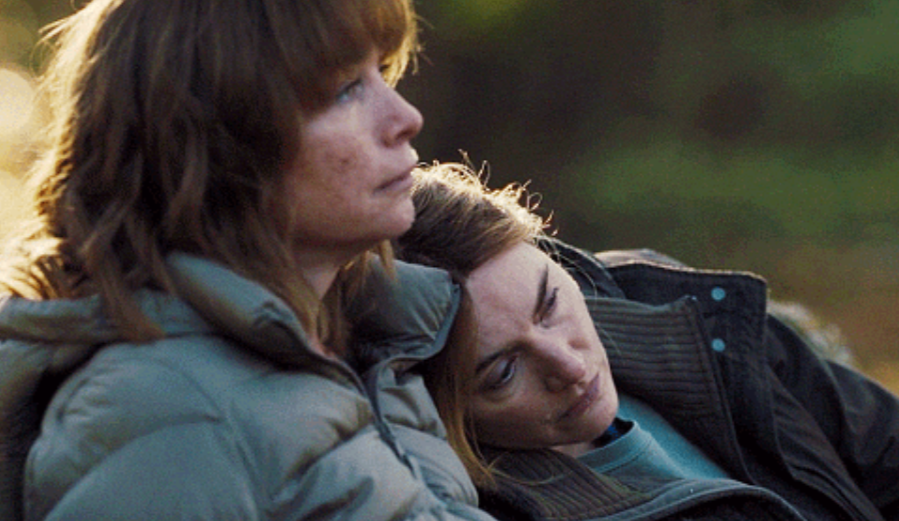
NATHANIEL: Julianne Nicholson is always top-notch and I'm stunned it's only clicking for people now (the same thing happened earlier in the spring with Kathyrn Hahn in WandaVision. It's like "you're only just seeing this now, people? Where have you been?!"). I'm not sure it's the best Nicholson has ever been -- i think she was Emmy win worthy in Masters of Sex for one example -- but another fine instance of how undervalued she's been for a long time now.
Here is where I confess that I've never enjoyed Evan Peters in anything before so it will sound like faint praise to say I think this is his best work. Apart from a terrible drunk scene (why can't he play that?) he was very good in this and surprisingly vulnerable. His date with Mare was heartbreaking in such a pure way. His confession about his career also plays so well in retrospect, recalibrating feelings I had about him in earlier episodes with the new information.
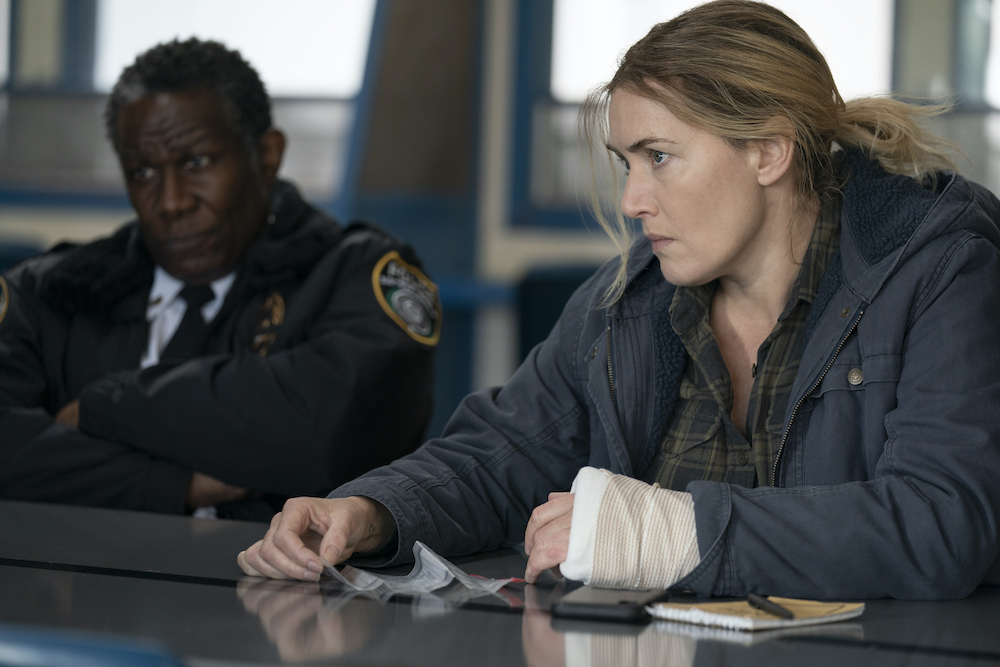
Oh one more shout out. I also enjoyed John Douglas Thompson as Chief Carter. He's understandably had it with Mare but at the same time you can see the history and that he respects her which complicates being at the end of his rope with her. I don't fully agree that everyone was excellent, though, as there were a few performances sprinkled about that were too broad (I shan't name names since they aren't famous) but mostly, yes.
Did you see Saturday Night Live's "murdur durdur" sketch? So funny but the laughs felt affectionate. And I'm still trying to figure out how a show so dour about a grumpy haunted woman, horrible crimes, and a dead end town ended up being so endearing to so many different people. But maybe that's the authentic rich tapestry we talked about, plus a pinch of Jean Smart (excellent and funny as per usual) and a whole lot of slow-burn Kate Winslet magnificence.
ERIC: Yes, it's wonderful how Jean Smart has become such a powerful "secret weapon" for so many productions at this point in her career. She and Winslet are magnificent together, capturing a fully-lived-in dynamic that's so joyful to watch. The SNL "murder durder" is priceless, one of their best skits in a minute. I think you're so right about the surprise "endearing" factor. The subject matter doesn't scream warm, but I do feel that the creative team remembered to give it some levity with an everyday humor. The situations in the story might be dire, but these characters don't always know it, they're just trying to get through. It's a piece that is very much about that "everyone is just trying to do their best" vibe. And the actors often find comic windows into scenes that could otherwise play so heavily. In my opinion, it's one of the miracles of Winslet's performance. There's a lot of comedy in there, in that she shows us that Mare views the world in a cynically comic way.

Which brings me to Kate. I think it's in the gallery of her greatest work, which is saying a lot from someone who has given us so much extraordinary work. What are your thoughts on her performance?
NATHANIEL: Our dear readers won't know this reading this conversation all at once but when you wrote "what are you thoughts on her performance?" I went blank for a whole week stopping this conversation in its tracks. APOLOGIES. How to possibly sum it up when I think it's easily her greatest TV performance ever (yes, stronger than her Emmy/SAG/Globe winning turn in Mildred Pierce) and right up there with multiple classic film performances. Where to even begin with a performance that stretches across seven hours and truly rewards that investment of time. She keeps deepening our understanding of this curt weary small town detective as it goes.
I'll admit that for the first two episodes I thought merely "she's good in this" but I wasn't listing it among her greatest characterizations. In Ammonite, her most recent performance prior to this mini-series I thought she was strong but not transcendent. I maintain that depression is one of the easiest things to act on the surface but one of the most difficult things to act with great nuance; in real life depression can take on many subtle forms but the end result, at least externally, is often a kind of fatigue and dullness. Your own emotional range, if you will, becomes compressed or smothered by the unhappiness, the 'what's it all for?' defeat. That's tricky for actors because performances live most fully on the opposite side of the spectrum, via their tonal flexibility and range of expression.

So Winslet is working from this extremely limited tonal register, but she's so precise and so winning that you slowly start seeing the person Mare is under that exhausted and blunt and a bit insufferable exterior. And you start loving her. When did you know you loved the performance, too?
ERIC: I agree on how much she gets out of that limited register, and of course part of the beauty of the performance is that Winslet fills in all of the gaps that show the repressed registers of that character. She's just such a fully fleshed-out human. One of the qualities she captures about Mare is her ability to see that other people are surprising and complex. In a profession based on patterns, she keeps the door open for incongruities as well, the kind of incongruities all humans have, and strange behaviors people indulge in for secret reasons. Because of course Mare herself has those nuances. But it's incredibly difficult to translate these kind of subtle layers into a performance, even with seven hours. A lesser actress wouldn't accomplish this, or they might telegraph it. Winslet has thought Mare through so thoroughly that she just breathes into the performance.
I felt like this character and this project really freed Winslet in a way that we haven't seen her in a while, which is ironic because she has so much weight to carry in this miniseries. The entire emotional and structural enterprise rides on her back, the way the situation does to Mare for that town, and there's joy in watching Winslet take it all on. I thought her acting was pure and exhilarating.
Any final thoughts on Winslet or the show itself before we sign off and leave it to (the many) comments?
NATHANIEL: What a great observation about the way she sees other people as surprising and complex. That's exactly it. And it's all the more remarkable because not only does Winslet do that but she's able to do that in different ways with each scene partner within the context of these very particular relationships. That's why I think the performance stays fresh throughout and deepens rather than feeling calcified and repetitive. It's a pretty astounding actorly feat when you consider that she also shows us that Mare herself has calcified and her life is very repetitive; She's been doing everything that we're seeing -- the vaping, the no fucks left to give rudeness, the house calls, the fights with everyone, the gruntwork of her job -- for a very long time. All of it keeps her going and her mind off her personal grief but she resents it, too.
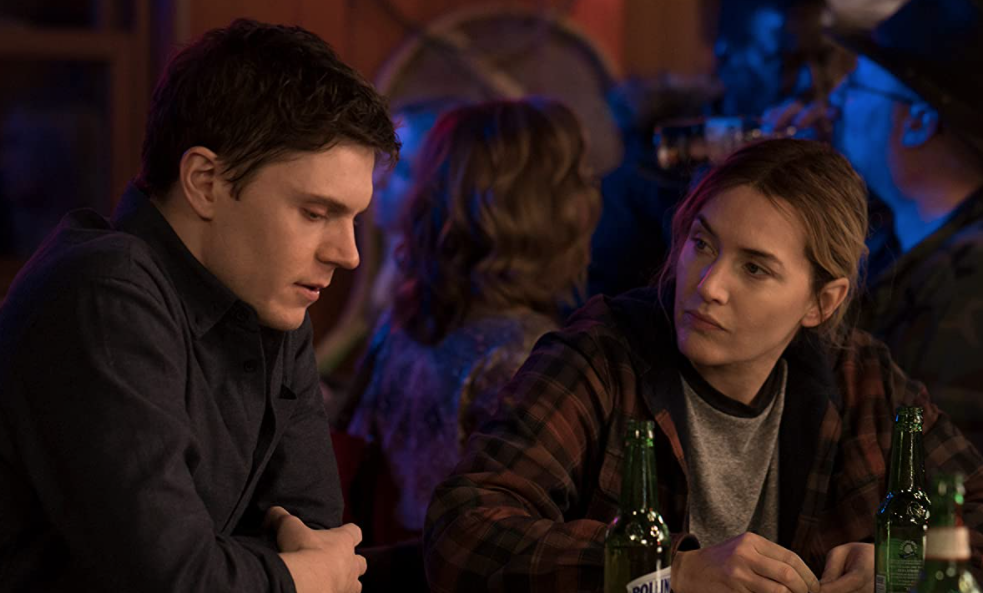
I'm sorry to go and on and on about her but I have to see even more about the way Mare's openness to complexity comes through with the other actors. I adore the way she navigates Jean Smart's very uncomfortable verbal acknowledgment that she's always rooting for Mare near the end of the show. Mare is not suddenly sentimental (that would be out of character) but she's also not dismissive of the effort her mom has just made to utter that sentence. This understanding of other actors and character-to-character feeling also pays huge dividends in her final gutting scenes with Julianne Nicholson.
One of my favourite subplots in the show was her brief flirtation with dating her co-worker (Evan Peters who we discussed). Her reasons for entertaining his crush start out very simple -- she wants to stay in the loop about the investigation since she's temporarily suspended. But because Mare is so astute about people, Winslet let's you see the detective's gamesmanship transforming into actual emotion. You can see episode-by-episode that she respects and likes him a little more every time. Not romantically, per se, but as a person. So she feels bad about the way she's treating him. I think this is why the violent end of that particular plot hits so much harder than it might in another show about awful violent crimes. It's also why that slap his mother gives her later on, stings all the way through the screen.
Talking about all of this has been as joyful as the show is dour, and that's mostly on Winslet. It's a sensational performance in a very good show. May Emmy voters feel the same!
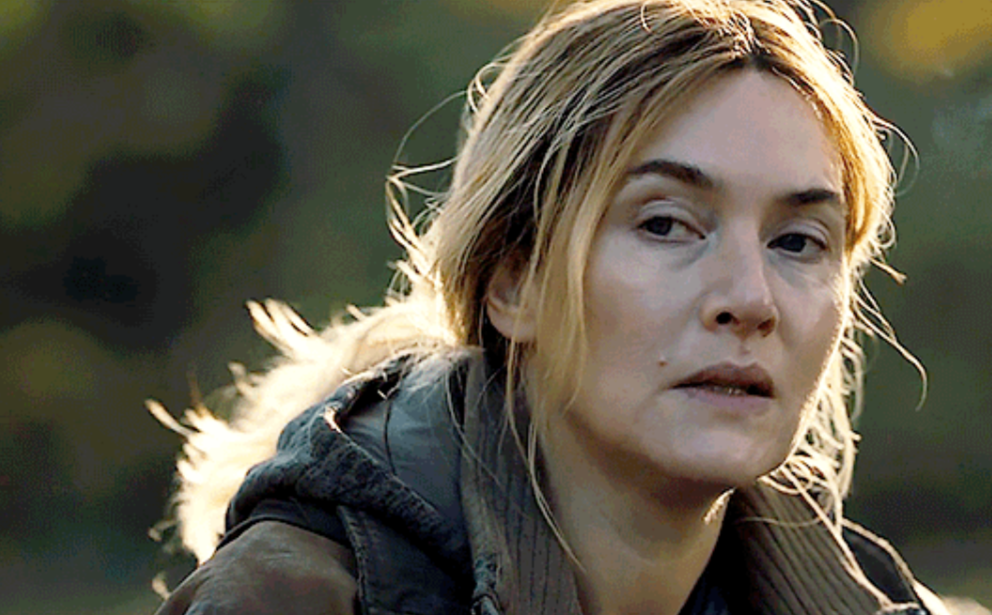
more on the upcoming Emmys
- COMEDY
- Actress Comedy
- Actor Comedy
- Supporting Actress, Comedy
- Supporting Actor, Comedy
- DRAMA
- Actress Drama
- Actor Drama
- Supporting Actress, Drama
- Supporting Actor, Drama
- MORE...
- Emmy Ballots
- FYC The Handmaid's Tale
- FYC Marielle Heller, Queen's Gambit
- FYC Hannah Waddingham, Ted Lasso
- FYC I May Destroy You
- FYC For All Mankind